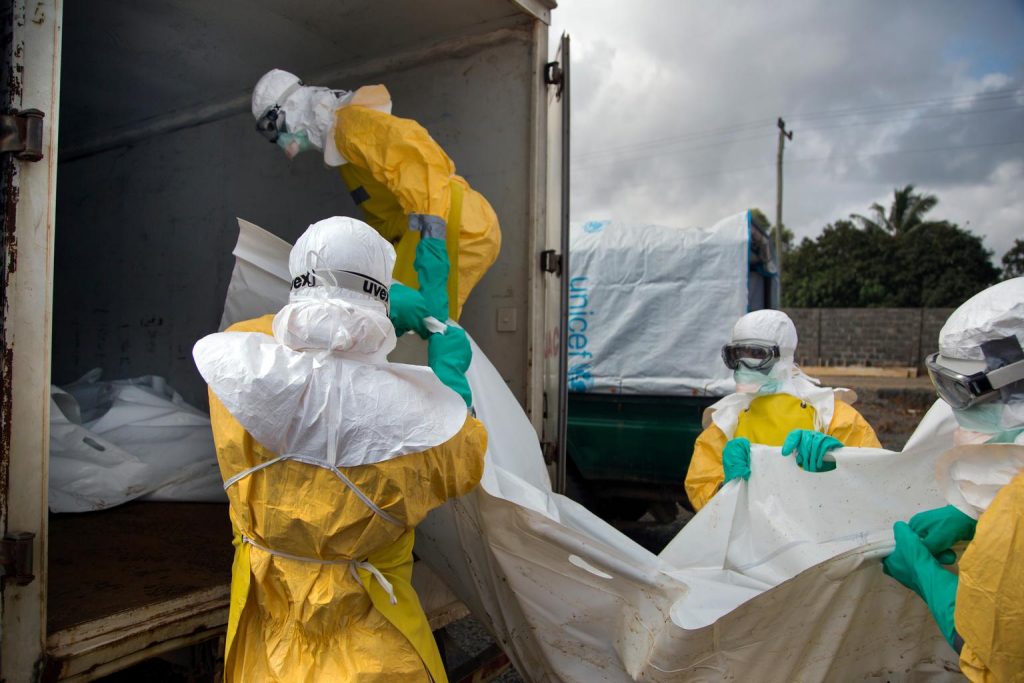Responding effectively to outbreaks, epidemics, and pandemics requires a certain amount of knowledge use and carry-over from one context to another. However, no two health emergencies are ever precisely the same. The variation in social context, political setting, aetiological agent, time horizon, geography, and a whole host of other factors, makes each emergency unique. Further to this, global or national emergencies are often composed of emergencies in multiple localities, each with their own complex challenges and problems. This diversity in response contexts makes using knowledge from other areas of an emergency, or from past emergencies, difficult. This SSHAP Case Study draws on an investigation of lessons from the 2013-16 West African Ebola Virus Disease (EVD) crisis.
Case study
Learning the Lessons of Crisis: Mobilising Knowledge During a Global Health Emergency
Regions
West and Central Africa
On 3 September in Liberia, men dressed in head-to-toe personal protective equipment load bodies into a truck, outside an Ebola treatment centre in Monrovia, the capital.
The worst outbreak of Ebola virus disease (EVD) in history continues to ravage communities in West Africa. UNICEF estimates that 8.5 million children and young people under the age of 20 live in areas affected by EVD in Guinea, Sierra Leone and Liberia, countries where disease transmission is widespread and intense. Of these, 2.5 million are under the age of 5. Preliminary UNICEF estimates also indicate that at least 3,700 children in Guinea, Liberia and Sierra Leone have lost one or both parents to EVD since the start of the outbreak. Nigeria and Senegal are also affected, having experienced an initial case or cases, or localized transmission. UNICEF remains at the forefront of efforts to respond to and help curtail the outbreak. In Guinea, UNICEF has been distributing bars of soap, bottles of chlorine for handwashing and household water treatment, and flyers with information on EVD; preventative practices have also been shared through a door-to-door campaign supported by UNICEF and partners. In Liberia, UNICEFs partners, in co-ordination with the Ministry of Health and Social Welfare and the United States Agency for International Development (USAID), are distributing household protection kits in the hardest-hit areas. The kits contains critical supplies protective gowns, gloves and masks, as well as soap, chlorine and a sprayer, along with instructions on the use and safe disposal of materials that help family caregivers look after Ebola sufferers as safely as possible. From 1921 September in Sierra Leone, UNICEF supported a Government-led campaign to reach every household countrywide with life-saving messages on EVD. On 16 September, UNICEF appealed for over US$200 million to continue such responses to the outbreak. A proportion of the funds will also go toward helping neighbouri
Related content
Evidence review
Rapid evidence synthesis: Mpox community protection
This note presents a rapid synthesis of evidence related to community protection in countries affected by the mpox clade 1b outbreak. Synthesising evidence related to community protection for mpox Medline, Africa Journals Online and Global Index Medicus were searched. IFRC,…
SSHAP
2025
Report
Meeting report: The impact of global aid funding cuts on people and programmes in South Sudan
Report of a roundtable with government actors, academics, development partners and journalists in South Sudan on the sweeping impacts on people and programmes of aid cuts and multiple, intersecting crises.
Central and East Africa Hub
SSHAP
2025
Briefing
Key considerations: Home-based care for mpox in Central and East Africa
This brief outlines key considerations on health system requirements for safe and inclusive home-based care for mpox.
Central and East Africa Hub
SSHAP
2025
Question Bank
Tools
Questions bank for healthcare workers during infectious disease outbreaks
This question bank is a menu of qualitative questions related to healthcare workers’ knowledge, perceptions and practices during infectious disease outbreaks.
SSHAP
2025


